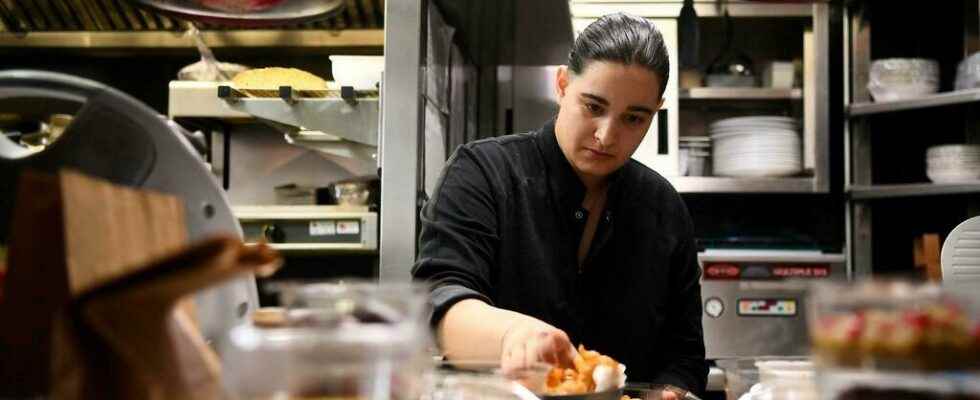On December 31, a New Year’s Eve that awakens the taste buds! For 6 years, Julia Sedefdjian has lived with a title that is a little heavy, but seriously rewarding: “ Youngest star chef in France ”: A title worthy of winning in Paris when she was only 21 years old. Since then, the star has not left her. The young Niçoise opened her restaurant Le Baieta in the 5th arrondissement and frankly thrives through a Niçoise cuisine that resembles her so much.
His father is Armenian and his mother of Sicilian origin, a perfect match for Mediterranean cuisine. His signature dish is the revisited bouillabaisse. But on this New Year’s Eve of December 31, here are a few discoveries: truffle cushion, onion compote, Cantabrian anchovies, foie gras in its natural state, mushroom powder, verjuice jelly, sea urchin tartlet, two textures, candied citron and turbot in short -bouillon, Camus artichokes and chestnuts, truffled white butter, Oscietra caviar … And for dessert, a variation of citrus fruits from his childhood, soft biscuit, creamy vanilla from Madagascar and lychee sorbet. If she has a lot of talent, Julia remains humble and shares her star with all her team.
His large black eyes shine like the frosting of a lightning bolt. A piercing emphasizes a well-defined mouth. Julia Sedeffjian enters the kitchen, in a black jacket and purple apron: she greets her team.
For the youngest starred chef in France, cooking is first and foremost sound and noise: the saucepan on the fire, the chopper, the wooden spoon in the casserole dish, the spices that are stacked, the egg that is broken. Like musicians, Julia works by ear.
” In the kitchen, we need our five senses. With a sound, I’m going to hear that it’s going too loud. There are good and bad noises. A lot of things are happening on the stove. For example, when we put our meats to color the juices, it crackles. When we hear that, we know that there will be a beautiful coloring. [On entend quelque chose tomber]. You hear, this is a bad noise “
Reducing the coat of arms of mackerel
Julia’s cuisine looks like her, it is straightforward and refined.
“Me, I like touching, having strong tastes, working with spices and tastes. I rarely use caviar, truffles. I like working with simple products, because that’s what made me love cooking. My mother made me simple meals. For example, for a fish, my touch is the cooking, the garnish, that will be the thing that will make the dish be a little more acidic. We will work on it so that a simple mackerel becomes a mackerel that can be served on a starred table ”.
To restore the image of mackerel, this blue fish invented for the broke, in order to treat fine beaks, this is Julia’s good pleasure.
Even if its holiday dish this year revolves around the elegant pink, orange langoustine, with its claw and citrus juices. ” We are going to work around a roasted langoustine, pearly to the heart, with a variation around the Nice squash. We can have kumquats. I love working on acidity, I love working on bitterness. We have here a beautiful product with langoustine, the squash will bring a little sweetness, a little sweetness. “
If the pretty brunette is a goldsmith of acidity on the plate, it’s because she grew up in Nice in the south of France. ” I love citrus fruits. I have memories, obviously, Menton is near my home. Menton lemons, citrus fruits, I ate them during my childhood. “
“We taste all day”
The young chef uses the word work. We work a fish or a meat, we stand up to it. There is a sometimes tense face-to-face between the product and the chef.
“I like to smell, I like to come into contact with the product. I love arriving in the morning, taking the fish out, getting it up, trying to understand it, seeing how we are going to cook it. This is first and foremost our job as a cook: it is to understand cooking. There is a part of intuition, a part of feeling with the attitude, precision, rigor. The hardest part is doing well every day ”.
And then you have to taste. During our conversation, a tall fellow, who assists the chef, lifts the lid of a pot in which the broth is shivering. He takes a spoon to check the seasoning.
“We taste all day. We taste what we do during the service, we re-season, we modify. During the service, for example, there are things warm, and as the reduction, it will concentrate in salt. So, if we don’t taste, over the course of the service, it will be too salty. We then adapt by adding a little broth. “
At the time of the evening shot, Julia inspects a first plate on the counter, turns it around, corrects the position of an unruly little grass. So, we go on tiptoe to let this orchestra play serenely in chef’s hat and apron.
